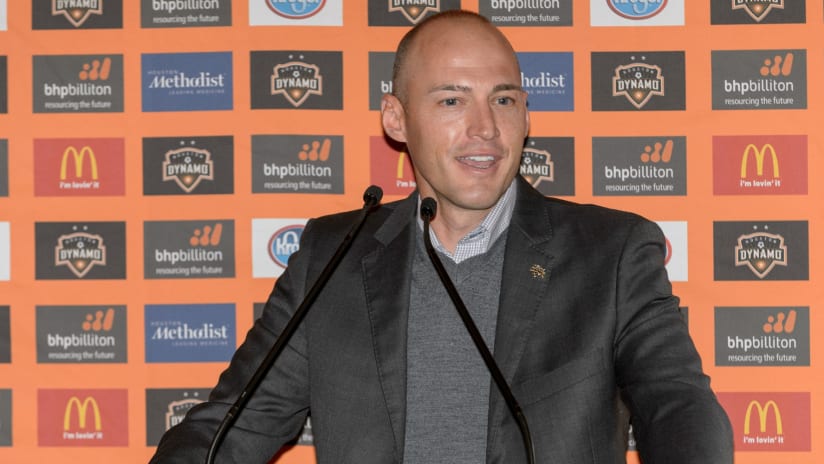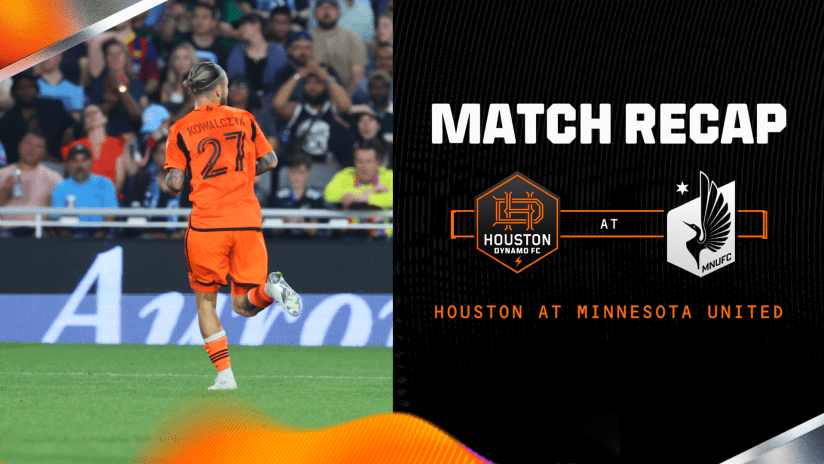This article originally appeared in the Oct. 18 Dynamo Matchday Magazine.
To say that 2015 has been a busy year for Matt Jordan is somewhat of an understatement.
In his first season as Dynamo Vice President and General Manager, Jordan has undertaken the task of restructuring the Dynamo to help it return to a place of prominence in MLS. This is easier said than done, as in order to do this the former MLS goalkeeper has had to implement a variety of changes to the way things were traditionally done within the team and its infrastructure.
Those changes include the development of a player scouting system that has forced him to become adept at living out of a suitcase and utilizing technology as the way to keep in touch with his family. In less than a year Jordan has traveled to Spain, and most recently Argentina, Chile, Uruguay and Colombia with the mission of finding players that can make the team better, not only in 2016, but in many years to come.
“We are always look to improve the team in the short term, but it is also important that you’re building a pipeline [of players for the future],” said Jordan. “Whenever there is a need for a position, you have a system in place that allows you to call upon a particular player that you saw play, perhaps 6 months or a year ago, whenever he’s needed.
“It’s not about just identifying the players. Finding good players is not the challenge. What’s most important is finding the right players that fit within the parameters of MLS and the salary cap structure that we have in place. That is where the challenge lies,” he added.
Having to watch 24 games in two weeks, as Jordan did during his most recent trip in search of the “right players." is a grueling schedule. But because soccer is practiced differently, technically speaking, in leagues around the world he likes to travel to see games and watch players in their respective environments first hand, as opposed to relying solely on game tape or second-hand accounts from scouts or contacts in those countries. This “eyes-on” approach allows Jordan to acquire a well-rounded concept of each league’s characteristics and, consequently, those of the players that participate in them.
“When you look at the tempo of the game in Argentina and Colombia, it’s very similar to that in MLS. Teams in both leagues don’t give each other much space and are very physical. Traditionally, Colombia produces very good center backs and forwards, with players who have speed out wide. Argentina is different in that it’s such a competitive league that players who have come [to MLS] have performed well. Uruguay is a market that is starting to produce an influx of players. Even though the quality of the league is not as high as Argentina, the characteristic of the players in the two countries are similar. Chile is another market that is starting to produce players that can compete in MLS, such as Octavio Rivero in Vancouver.”
Jordan has visited some of these countries several times already, having been able to identify players that have already made an impact on the team, such as Raúl Rodríguez, Leonel Miranda and Mauro Manotas. But, is there a particular reason why he keeps going back to these countries looking for talent? Will he turn his attention to other regions, such as Central America or Africa, where players are also available and ripe for the picking?
“Budgets and the financial feasibility of players [are important factors when deciding where to look]. So much of the timing of bringing players has to do with the economy of that [country] and the transfer market of that particular league. That is why players from some of those countries are financially attainable. Places like Argentina and Spain currently make it easier to look at players that weren’t as affordable four or five years ago. If you look at Germany and England, two of the most financially-stable leagues in the world, you quickly realize that players who come from there are traditionally more expensive. Other markets that are interesting are Central America, Africa and Europe, depending on the market. Overall, we are willing to look in any region as long as we find players that we feel will help us improve.”
For Jordan, the need exists to find a balance and think beyond today and into the future. Winning in the short term is an obvious priority, but having a plan in place that consistently delivers results on and off the field in the long term is what drives him to strategically spend where he feels the team needs it most.
“We won’t try to pretend that we are a club that can spend millions of dollars a year on a player or two. Our model relies on looking at opportunities that allow us to acquire young players whenever possible that can help the club in the long term. Every time we look at a player, we ask ourselves: ‘will this player help us be successful?’, and we go from there. We have athletes from all walks of life: Central Americans, South Americans, players from Europe and Africa. Players from North America are critical to our success as well. At the end of the day, our goal is to put a team together that our city can be proud of.”
Regardless of what happens in the remainder of the 2015 season, a year that presented the Dynamo organization with a variety of on-field challenges by way of injuries and international callups, among others, and a significant off-field restructuring highlighted by the addition of Jordan and new head coach Owen Coyle, the organization remains focused on the future. It is this vision of days and years to come that drives Jordan to doing “whatever is humanly possible” to put together a team that is competitive next season and beyond.
“Every season has ups and downs and presents its unique set of challenges. How well you do depends on how you react to them. I believe we are currently putting many good things in place that will allow us to take the necessary steps to help this club grow and be successful. You need to have a plan in place that allows to you steadily and incrementally work toward your goals. Dynamo fans can rest assured that we’re putting in a tremendous amount of work to help our team improve and move in the right direction.”





